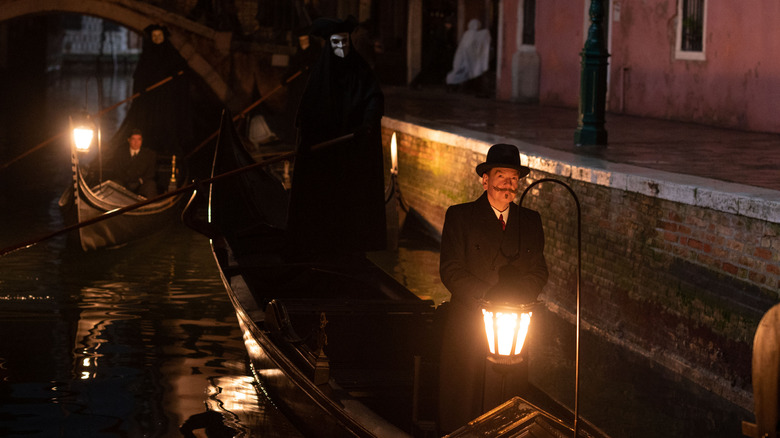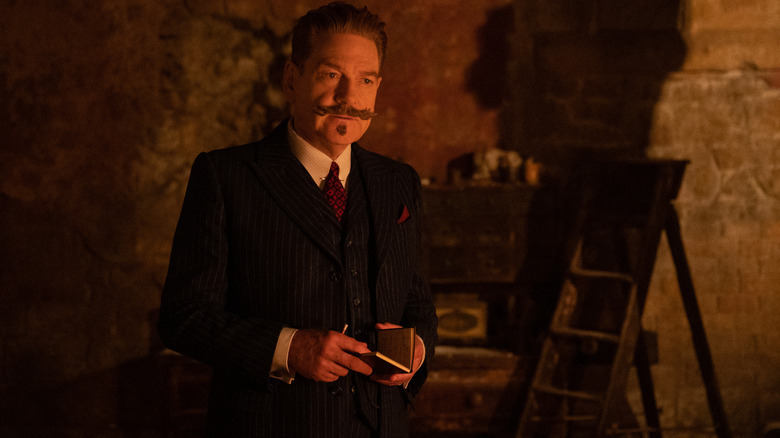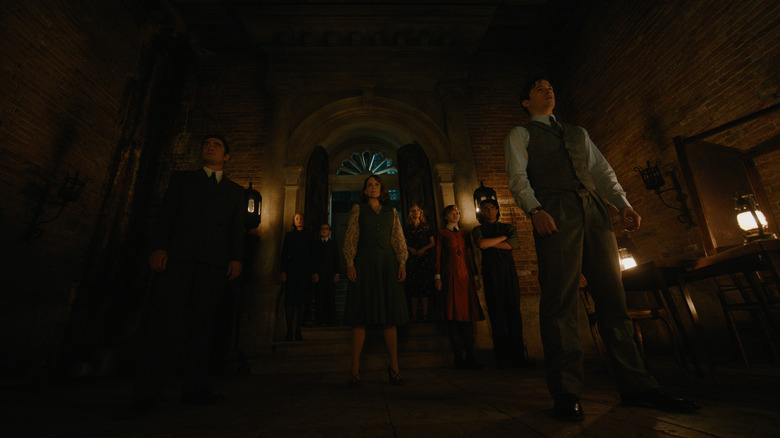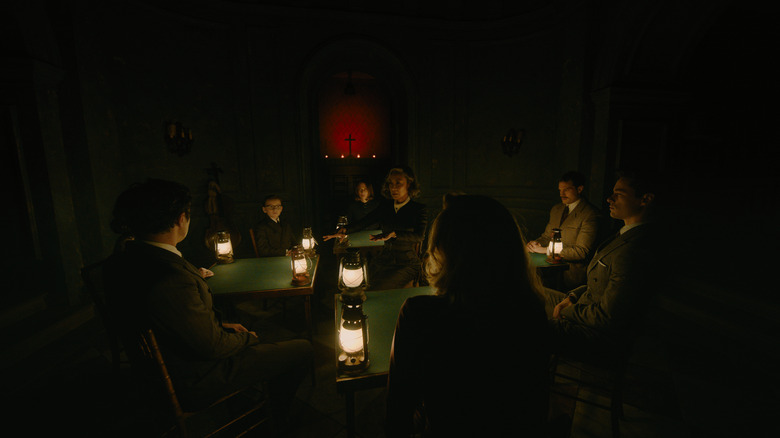The Biggest Inspiration For A Haunting In Venice Is A Real-World Crime – Sort Of
Warning: this article discusses major spoilers for "A Haunting in Venice."
It's the moment everybody looks forward to during the trailer for director Kenneth Branagh's newest Hercule Poirot movie. A half-dozen or so A-listers have been crowded into a claustrophobically tight space in some exotic locale. Each character wears expressions that somehow ride the line between crushing guilt and sheer incredulity that they could ever be considered criminals. And, with a magnificent flourish, Branagh's immaculately-groomed mug turns to the camera and somberly pronounces through his thick, deeply-exaggerated Belgian accent: "There has been a murder, and you are all suspects!" (Wait, I may be thinking of something else entirely.)
Despite beginning with its main detective in a far different emotional state than the previous films — living out his days in self-exiled retirement after losing his taste for crime-solving — "A Haunting in Venice" (reviewed by /Film's Josh Spiegel here) doesn't so much as reinvent the classic formula that brought novelist Agatha Christie and the various adaptations of her work so much success. Rather, Branagh and screenwriter Michael Green purposefully hew close to all the fan-favorite touchstones of the genre, but with the added wrinkle of only taking the loosest inspiration from the source material this time around. This may leave viewers wondering whether the creative team looked to other references when it came time to punching up a story that few, admittedly, would consider among Christie's best.
The answer, fittingly enough, is anything but straightforward. While the murder at the heart of this mystery isn't based on any one true story, Branagh's latest outing does channel its horror through some very real-world atrocities. By specifically setting this supernaturally-tinged tale in 1947 and emphasizing the ghosts of Poirot's past, "A Haunting in Venice" shines by reckoning with the scars of war.
Battle fatigue
It feels like a rare feat these days for a studio feature to deliberately disorient its target demographic in a way that doesn't frustrate viewers, but "A Haunting in Venice" pulls this off right from its opening moments. It's telling that quite a bit of time passes before we're informed of why Poirot, a detective who seemingly craves an unsolved murder more than the rest of us need air to breathe, has abruptly left his life's calling behind. We're left to rely on context clues to figure this out for ourselves: the specific time period, our hero's startlingly cynical rejection of those who are clearly in need, and the slow teasing out of our eclectic cast of characters, the various backstories of whom come hopelessly intertwined with the ravages of World War II, which only just concluded.
We've known since "Death on the Nile" and its unfortunately silly mustache origin story that Poirot is haunted by his memories of serving in World War I, but "A Haunting in Venice" deploys a much less grating and more elegant approach to unspooling our main character's psychology. While Christie's novels typically hold the world-famous genius at an unknowable remove, Branagh's inclination to uncover what makes him tick finally hits its stride with, of all things, a ghost story. Notably, our ever-rational Poirot's skepticism of Joyce Reynolds' (Michelle Yeoh) powers as a psychic medium doesn't stem from scientific logic. As he eventually admits, the senseless cruelty he's seen in both war and crime prevents him from believing in the existence of the extreme other end of the supernatural spectrum — God.
But neither religion nor even the killer themselves are the main focus here. Instead, "A Haunting in Venice" presents a more formidable foe. Everywhere Poirot goes, death, suffering, and trauma follows.
The walking wounded
Nowhere does the film's main concern about PTSD and the enduring harm of war manifest itself more clearly than its ensemble of oddball supporting players. Initially introduced as a collection of flawed and staggeringly damaged individuals, it's easy to imagine a version of this story where none of them ever rose beyond the script's basest requirements of needing warm bodies to serve as self-incriminating suspects to Reynolds' shocking murder on Halloween night. Instead, Green's sharp writing and Branagh's compassionate directing gives each and every character in turn their own deeply-felt sense of pathos.
With the sole exceptions of the phony Mrs. Reynolds and Tina Fey's hard-luck writer Ariadne, both of whom only have utterly selfish motivations, everyone is weighed down by trauma and pain. Kelly Reilly's Rowena Drake mourns the loss of her dear daughter Alicia (Rowan Robinson) a year prior, the inciting event that spreads its tendrils throughout the rest of the cast. Riccardo Scamarcio's ex-cop Vitale, for instance, specifically left the force after recovering Alicia's body. Kyle Allen's Maxime, meanwhile, plays the role of Alicia's jilted ex who holds himself responsible for her apparent suicide. The family doctor Leslie (Jamie Dornan) most overtly represents Poirot's dark reflection, unable to carry out his job or even take care of his young prodigy of a son Leopold (Jude Hill) because of his WWII trauma. Half-siblings Nicholas and Desdemona (Ali Khan and Emma Laird, respectively) are refugees of war, scrounging money as Reynolds' assistants to escape to America. Even Reynolds and Ariadne factor into the film's themes, further complicating Poirot's tenuous grasp on what's real and what's not through their deceptions.
Ultimately, none of these personalities are equipped to grapple with their grief, and it takes one horrific Halloween night to provide closure — one way or another.
The real haunting all along
The hallmark of any great murder-mystery comes from mastering the art of the misdirect, and "A Haunting in Venice" does so by presenting itself as a horror movie. Yes, obviously the entire plot hinges on Ariadne dragging Poirot to Mrs. Reynolds' séance, where she attempts to communicate with the spirit of Alicia and discover whether she was actually murdered or not. And Poirot's rapidly disintegrating frame of mind as he begins to experience more and more inexplicable events drives much of the film's central tension and suspense. But beneath all these genre trappings remains a portentous thriller that asks one fundamental question: What are truly the ghosts of Poirot's past?
At his core, the great detective's biggest internal conflict in "A Haunting in Venice" isn't about whether this latest murder (or three) has supernatural causes or not. The world that Branagh has created with these movies, as outrageous as they get at times, is a grounded one and such a flimsy premise would never be able to hold the film together half as well as it does. Instead, this third film manages to do what the previous two could not by opening a window into Poirot's very soul. He hasn't lost his mojo and turned his back on his murder-solving ways out of disinterest or old age, but out of his debilitating worldview that no good can be done in a world that never learned its lessons from the first Great War by promptly engaging in another.
The events of the film shakes Poirot out of this stupor. Although the actual solving of the case unveils extreme levels of depravity, Poirot's faith in humanity is nonetheless restored. There will always be murder and there will always be suspects, but who better to find true justice than a quirky, funny-looking man who's been through the fires of war and back again, better than ever?
"A Haunting in Venice" is currently playing in theaters.



